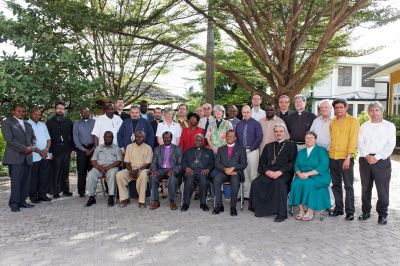The Conference of Secretaries of Christian World Communions (CWC) recently met in Tanzania for its tenth Forum on Bilateral Dialogue. Delegates were invited by the CWC and the Commission on Faith and Order of the World Council of Churches[1]. In addition to reporting on recent bilateral dialogues, we discussed developments and inter-dialogue relations in terms of context and reception, with a particular focus on the changing face of global Christianity. We were grateful to the Roman Catholic Episcopal Conference of Tanzania and the Kurasini Conference Centre for their generous hospitality, and to the members of local churches for supporting the programme and making it possible for us to attend Sunday services.
The forum’s first meeting in Africa examined the significant changes to Christianity worldwide in the last century. Its “statistical centre of gravity” has shifted considerably towards the southern hemisphere and is continuing to move southward.
Christians of all denominations are becoming increasingly scattered around the globe, and this is affecting all world communions. We therefore made it our goal to observe the influence of this shift on the dialogues to date and to draw up recommendations that stimulate realisation and reflection. In particular we reflected on the content, characteristics and formation of each dialogue in relation to its subsequent reception.
Similar matters were reflected by the CWC delegates, about half of whom come from or work in the “South”. Following the welcoming remarks of Bishop Bruno Ngonyani, President of the Ecumenism Commission of the Tanzania Episcopal Conference, local ecumenical leaders from the churches in Tanzania, especially Dar es Salaam, reported on their experiences. This was followed by a panel discussion. In their description of the close cooperation between the Tanzanian Roman Catholic Episcopal Conference, the Christian Council of Tanzania and the Pentecostal Council of Tanzania, the speakers highlighted the importance of prayer for the constantly changing relations at all stages of their development. Their presentation was an illustration of Bishop Ngonyani’s statement: “The ecumenical movement in Africa is not lagging behind. We may not be at the forefront of theology, but we are active in the dialogue of life.”
Other presentations and discussions at the forum addressed the topics of “Where ecumenical disagreement pains the churches in the South” and “North–South relations in the CWC”. Working with these themes was an effective introduction to the subsequent reports from the CWC members on the development of their bilateral dialogues since 2008. Additional valuable context was provided by Professor David M. Thompson, whose presentation was titled “A short history of the bilateral dialogue forum”.
It was clear from the beginning that finding the right vocabulary would be complicated. Dividing the world into “North” and “South” makes incontestable assumptions and raises the question of who decides where the border lies. The picture is blurred further by migration, whether it was hundreds of years ago or is a present-day occurrence. In our discussions we found that contexts, cultures and experiences in both the “North” and the “South” are diverse and complex, and that generalisations have no universal value. If we use these terms, we must remember that they are unsatisfactory and that Christianity was born in Palestine before spreading eastwards, westwards, northwards and southwards.
The worldwide church communions are responsible not only for the dialogue process as a whole, but also for its reception. The way in which communions all over the world conduct and receive their dialogues is a matter of context. It is important that they do not lose sight of the necessary balance in the process.
This report is a free account of a preliminary report that has not yet been completed. The final report will contain a set of recommendations to ensure balanced procedures for the bilateral dialogues of the CWC and their reception. One of the key recommendations will be that institutes of theological education provide their students with a solid knowledge of past and current dialogue processes.
Bern, March 2012
Peter Feenstra
[1] The participants came from the Anglican Communion, Baptist World Alliance, Disciples Ecumenical Consultative Council, the Ecumenical Patriarchate, the Greek Patriarchate of Alexandria and Africa, Lutheran World Federation, Mennonite World Conference, World Methodist Council, Organisation of African Instituted Churches, Roman Catholic Church, Old Catholic Churches of the Union of Utrecht, World Alliance of Reformed Churches and the Commission on Faith and Order (WCC).

